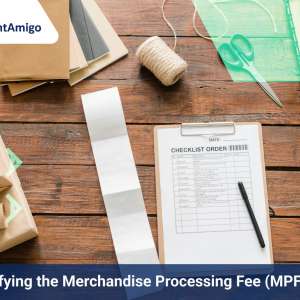Author Name: Tiffany Lee – Marketing Analyst at FreightAmigo
Import duties and taxes play a crucial role in international trade, and Germany is no exception. As a global economic powerhouse, Germany has established a complex system of import duties and taxes to regulate the flow of goods into the country. Understanding these regulations is essential for any business or individual involved in importing goods into Germany. In this expert guide, I will break down the fundamentals of import duties and taxes in Germany, explain why they are important, discuss the different types of import duties and taxes, provide insights into calculating them, and explore the thresholds and exemptions that exist. By the end of this article, you will have a comprehensive understanding of navigating import duties and taxes in Germany.
Want To Compare The Best Express, Air Freight, Sea Freight, Rail Freight & Trucking Rates So As To Have Better Control On Cost?
Understanding Import Duties and Taxes
Import duties and taxes are charges imposed by the German government on goods imported into the country. These charges serve multiple purposes, including protecting domestic industries, generating revenue for the government, and maintaining a level playing field for both domestic and foreign businesses. Import duties are typically imposed as a percentage of the customs value of the imported goods, which includes the cost of the goods, shipping charges, and insurance. Taxes, on the other hand, are usually applied to the customs value plus the import duties.
Why Import Duties and Taxes are Important in Germany
Import duties and taxes play a crucial role in Germany’s economy. By imposing these charges, the government aims to protect domestic industries from unfair competition, encourage local production, and maintain a balance of trade. Additionally, import duties and taxes generate revenue for the government, which can be used to fund public services and infrastructure development. Moreover, these charges ensure that imported goods are priced competitively with domestically produced goods, creating a fair marketplace for both domestic and foreign businesses.
Types of Import Duties and Taxes in Germany
Germany has several types of import duties and taxes that are levied on imported goods. The most common types include:
- Customs Duties: These are taxes imposed on imported goods based on their classification in the Harmonized System (HS). The HS is an international standard for classifying products, and each product is assigned a specific code that determines the applicable customs duty rate.
- Value Added Tax (VAT): VAT is a consumption tax levied on the value added to goods or services at each stage of production and distribution. In Germany, the standard VAT rate is 19%, but certain goods and services may qualify for reduced rates or exemptions.
- Excise Duties: Excise duties are specific taxes imposed on certain goods, such as alcohol, tobacco, and energy products. These duties are intended to regulate consumption, protect public health, and generate revenue for the government.
Calculating Import Duties and Taxes
Calculating import duties and taxes can be a complex process, as it involves various factors such as the customs value of the goods, the applicable duty rates, and any exemptions or preferential treatment. To calculate import duties, you need to determine the customs value of the goods by adding the cost of the goods, shipping charges, and insurance. Once you have the customs value, you can apply the relevant duty rates based on the HS code of the goods. Similarly, calculating VAT involves applying the applicable rate to the customs value plus any import duties. It is important to note that certain goods may qualify for duty reductions or exemptions based on trade agreements or special programs.
Duties Threshold
In Germany, there is a duties threshold below which import duties are not levied. This threshold is currently set at €150. If the customs value of the imported goods is below this threshold, no import duties will be payable. However, VAT is still applicable regardless of the customs value. It is crucial to consider this threshold when importing low-value goods into Germany to avoid unexpected costs and delays.
Duties Exemption
Certain goods may qualify for duties exemption or preferential treatment based on trade agreements or specific programs. For example, goods imported from countries within the European Union (EU) are generally exempt from import duties, as the EU operates as a single customs territory. Similarly, goods imported under free trade agreements may benefit from reduced duty rates or complete exemption. It is important to research and understand the specific requirements and provisions associated with these exemptions to take full advantage of them.
Conclusion
Navigating import duties and taxes in Germany is a critical aspect of international trade. Understanding the fundamentals of import duties and taxes, including their significance, types, calculation methods, thresholds, and exemptions, is essential for anyone involved in importing goods into Germany. By familiarizing yourself with these regulations and seeking professional advice when needed, you can ensure compliance, minimize costs, and maximize your business opportunities. FreightAmigo, with its expertise in international freight forwarding, can provide you with the necessary support and guidance to navigate the complexities of importing goods into Germany. Contact us today to streamline your import process and leverage the vast opportunities that Germany has to offer.
There Are Different Options For Cargo Transportation. If You Want To Choose The Most Convenient And Suitable Solution, It Is Best To Have The Full Support Of Logistics Experts! If You Are Planning To Ship Goods Overseas, Please Go To The FreightAmigo Page For Inquiries.
===
Read More:
【Cosmetic Product Recycling】 A Guide to Sustainable Reverse Logistics
【Rise of Green Supply Chain】 Pioneering Sustainable Practices in Logistics
【ESG in Logistics】 How ESG Practices Drive Social Responsibility in Logistics
===
If you have any inquiries on logistics/supply chain, feel free to contact FreightAmigo now:
Chat with us online OR
Phone : +852 28121686
WhatsApp: +852 27467829









































